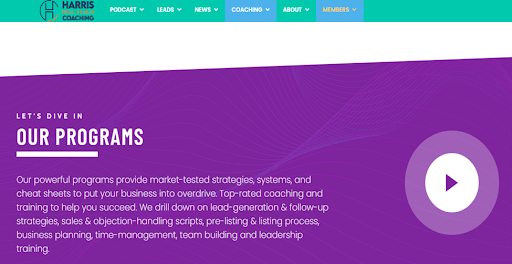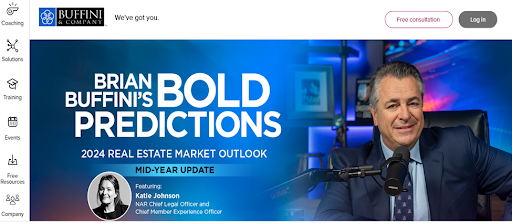How to Become a Real Estate Coach?
Are you a successful real estate agent dreaming of a six-figure income as a coach? Then, real estate coaching is your avenue to enter the fast-paced success game! Moreover, the real industry is an excellent diversification to an individual’s investment portfolio, considering the $363K average home value in 2024 and the 3.3% gain from the previous year.
But, like every business, you need a proper roadmap to find success as a real estate coach! So, if how to become a real estate coach is a question that intrigues you, this blog will guide you through!
Here are the touchpoints of the blog:
- Who is a real estate coach, and the essential qualities of being one
- The steps to become a real estate coach
- Earnings of real estate coach
- Popular real estate coaches and strategies
Who is a Real Estate Coach?
A real estate coach is an experienced professional who helps other real estate agents and investors grow their businesses. Coaches help clients navigate real estate opportunities, create a good property portfolio, and help with buying, selling and renting properties.
Here’s what real estate coaches do:
-
Marketing
Provide effective marketing strategies, tips on paid advertising, social media marketing, etc.
-
Financial Growth
Coaches help with goal-setting, deciding financial milestones, and tax planning, as well as increase your ROI and overall productivity.
-
Time-Management
Help prioritize tasks, manage time effectively, and expand your business.
-
Lead Generation Strategies
Coaches offer sales advice, such as how to close a listing, effectively convert leads, etc.
-
Client Relationships
Get insights on communicating well, following up with clients, and nurturing relationships.
-
Build Property Portfolio
Identify the best real estate opportunities with good returns that help to build a great property portfolio.
What are the Qualities of a Real Estate Coach?
So, what does it take to be a real estate coach? If you are serious about pursuing a real estate coaching career, here are the qualities and skill sets required to be an online coach!
-
Extensive Real Estate Knowledge
Having a real estate agent, broker, or realtor background is a great place to start your real estate coaching career.
-
Accountability
Great coaches analyze clients’ skills and backgrounds and offer personalized business growth strategies. They keep track of systematic and logical attainable goals and help you excel as a coach.
-
Coaching Skills
As a coach, natural leadership and teaching skills would make it easier for clients to learn from you!
-
Good Communication & Listening Skills
Active listening helps coaches to reflect on the client’s journey, set goals, provide positive feedback and offer a personalized business roadmap.
-
Online and Offline Marketing Strategies
Top real estate coaches know the significance of real estate marketing techniques. Some modern techniques include setting up website blogs, blogging, posting social media posts and paid advertising.
How to Become a Real Estate Coach in 7 Steps?
Real estate coaching can be overwhelming. However, if you are serious about pursuing a career in real estate, follow this detailed roadmap!
Let’s navigate through the 10-step process for becoming a real estate coach!
Step 1: Gain Real Estate Industry Experience
The first step to start as a real estate coach is to be an experienced real estate agent. You could be a real estate broker with a license or be a part of a real estate agency. Knowing the ins and outs of the real estate world would help you add value to coaching programs.
While license and certifications get you started, experience earns you the sliver of success to establish a profitable coaching business! Moreover, when you tell people about your experience as a real estate agent earning a six-figure income, you have already won their trust! This is a great way to start your coaching journey!
Step 2: Define Your Niche
Finding your niche helps you to distinguish yourself from other real estate coaches. Specializing in a particular niche makes you an expert in that field and attracts more clients. While you might have a wide knowledge of the real estate industry, being a “jack of all trades” won’t help you with long-term success!
Niching down doesn’t limit opportunities; instead, it helps to build authority in your domain!
Consider the following aspects to find the right niche:
- Experience and expertise
- Your Interest and passion
- Market demand and competition
- Profitability
To get started, here are a few profitable real estate niches you can capitalize on:
- Location-based niches (Focusing on country, town, ZIP Code)
- Demographic real-estate niches (Focusing on specific categories like age, income, gender, profession, family, lifestyle, etc., like first-time buyers, investors, multi-family properties, etc.)
- Property-type real estate niches (Luxury properties, new constructions, condos and homes, vacation rentals)
- Other niches include relocation buyers, foreclosures, rentals, etc.
Stay adept with the market trends and validate if the niche idea is profitable before finalizing your niche.
Step 3: Get Certified
Although it is not essential to become a certified real estate coach, it offers you the necessary credibility to get started! You can either take a certification specific to the real estate field or a business coaching certification that can help you with your overall coaching career.
Listed below are popular real estate certifications:
- Real Estate Investing Certification
- Real Estate Negotiation Expert
- Certified Commercial Investment Member (CCIM)
- Coaching Certifications from INSEAD and the International Coaching Federation (ICF)
- Workshops conducted by the National Association of Realtors (NAR)
Research what different certifications offer and choose the best program based on your goals and budget. The certification could be used either as a coaching program, course, or workshop.
Step 4: Design Your Coaching Program
Now that you are certified, it’s time to design the most crucial part of your business — your coaching offer! While creating your coaching program could involve many aspects, it typically depends on your business goals.
Do you wish to transition from real estate to coaching? Or is building a multi-millionaire coaching company your ultimate dream?
To begin with, you are selling the transformation or the end result and not actually your coaching method. For instance, an offer like “how to be a luxury agent with your 16-week coaching program and reach the $200K GCI(gross commission income) mark.”
Here are a few questions that would help you design your coaching offer:
- Who are your ideal clients?
- What is your coaching program’s unique selling point?
- What are the skills or the outcomes your clients would take away?
Tip: Generally, a 3-month coaching program is ideal while starting out. It is good enough to observe results yet not a long commitment.
Let’s understand with a real estate coaching program example!

Harris Real Estate coaching program is a top-rated program offering market-tested strategies, cheat sheets, lead-generation and follow-up strategies, and more to aspiring gents.
The coaching program includes the following:
- Daily Coaching Calls
- Private FB Group
- Learning Library
- Lead Generation System, Prospect Scripts, Objection Handlers
- Listing System & Presentation
- Top of Mind Marketing
And more …
Here are the different coaching programs offered by Harris Real Estate Coaching Business!

Different Real Estate Coaching Programs: Premier, Premier Plus, Premier VIP, Elite 1:1
Step 5: Setting Prices for Coaching Program
While you might have designed the contents of your coaching program, determining a price could be challenging! You shouldn’t charge too high to avert new clients or too low to coach without profits!
The key is to find a balance between your price and the value you offer. Your prices essentially determine your face value when becoming a real estate coach.
Prices are determined by the market demand, the coaching program’s value, experience, and target audience.
Here are a few pricing models for coaching prices:
-
Flat rate
One-time fee for coaching training and valuable resources.
-
Monthly/ retainer pricing
A fixed price for coaching every month, including weekly sessions, masterclass, masterminds, videos and documentation, and live community.
-
Tier-based pricing
This includes different coaching packages, from the basic one with limited coaching calls and features to the more premium ones with advanced features.
Tip: When starting as a real estate coach, $1,500 for a 3-month package is a good price. For this price, you can offer 2 private coaching calls and additional communication, such as phone, email or WhatsApp group support.
Step 6: Create Your Professional Website
Your clients need a point of contact to explore your coaching program and credibility as a coach. Your professional website is the best way to prove your online presence! If you are just starting out, create a quick one-page website with your bio, your picture, and a contact form.
Additionally, you can probably get a few testimonials or case studies from your previous clients!

Step 7: Win Your First Coaching Clients
Now that you have crafted your first offer and your official website, it’s time to attract your first client to your coaching business!
Winning your first client is often the most essential and hardest milestone for your business!
But before you start with endless errands of outreach and DMs, you need to have a super specific niche. Marketing yourself as a real estate coach isn’t enough. You need to define your unique business proposition!


You don’t need a massive social media following to win your first set of clients. You can capitalize on your local market, such as your neighborhood, ZIP code, or town. Once you establish authority there, try targeting the next level!
Here are the different ways to win your first coaching clients:
- Spread the word in your existing network of family and friends.
- Build your brand on social media with valuable content.
- Send personalized messages to prospective clients on LinkedIn, Facebook, and Instagram.
- Join niche-specific Reddit groups, engage with members and market your services.
- Offer free introductory sessions or workshops to demonstrate your expertise
- Follow up after your first interaction, and maintain a CRM to track your leads.
- Leverage a referral system to incentivize people who win you clients.
Step 8: Marketing Coaching Services
Now that you have your first set of valuable clients, it’s time to use marketing strategies to attract more coaching clients.
Let’s explore new marketing strategies to grow your client list!
- Leverage Facebook and Instagram ads to attract clients.
- Post insightful videos and posts on social media platforms like Facebook, and LinkedIn, Instagram.
- Create valuable content through blog posts covering trending topics, statistics, tips, or the existing housing market demand and supply.
- Interview on popular podcasts like The Investor’s Podcast or create your own podcast channel.
- Attend local workshops, seminars, and events, and discover networking opportunities.
- Collect case studies, testimonials and showcase your expertise on your website and social media.
- Send emails with your introductory video, transformation bio and calendar scheduling link.
Step 9: Scale Your Business
One of the final steps in your coaching journey is to scale your coaching business.
You might have streamlined your systems, reached your initial revenue milestone, or had a fixed number of clients.
If you need to establish a six-figure coaching business, you must have a strategic growth plan.
Here are the different ways to scale your business:
-
Create a Real Estate Coaching Course
Is your signature coaching program a blockbuster? Sell an online course based on your popular real estate coaching program. This is a great way to earn passive income, and the only investment you need here is the time to create a coaching course!
-
Diversify with Group Coaching
If you have gained expertise in 1:1 coaching, explore the group coaching model. This is a lucrative coaching model, as you can coach multiple clients and earn higher coaching revenue at the same time.
-
Hire More Staff
Establish a skilled and excellent team, including a virtual assistant, transaction coordinator, and assistant coach. This is a great way to maximize your profits.
-
Expand into New Real Estate Niches
Once you have established your domain authority in a specific niche, you can explore related niche markets.
Step 10: Building Credibility
The best way to build credibility as a coach is to be consistent and continuously evolve with change. Next, you can gather testimonials from your existing clients and share them on social media or your professional website. Testimonials are social proof of your coaching program’s effectiveness.
Testimonials provide an “insider perspective” about your coaching program and instill confidence. Credibility helps you to build trust, which is essential in any coaching relationship!
Do you wish to make a 7-figure income from real estate coaching? Watch this comprehensive video to establish your dream real estate coaching business.
How Much Can You Earn as a Real Estate Coach?
Real estate coaching is a profitable career path for agents seeking guidance and exploring the real estate industry. According to Glassdoor, the average salary of a real estate coach in the US is typically $102,426 per year.
According to ZipRecruiter, a real estate coach earns an average hourly pay of $19.70. The salary depends on several factors, including skills, experience, location, and the value offered through coaching programs.
Successful Examples of Real Estate Coaches
If you’re serious about real estate coaching, take cues from these inspiring real estate coaches and craft your unique business strategy.
Tom Ferry
If you are speaking about real estate coaching, you can’t ignore the influence of Tom Ferry. With an expansive experience of 23 years as a luxury real estate coach, Tom Ferry is termed as “2023 Inman Power Player”. His brainchild Ferry International is a leading real estate coaching and training company.
Ferry’s coaching program is centered around the popular “8 Levels of Performance”; needless to say his programs are synonymous with real estate coaching. Rigorous accountability coaching, a popular YouTube channel, engaging training events, and being a best-selling author are among the remarkable feats in his real estate coaching career!
Best Coaching Programs
Tom Ferry’s Prospecting Bootcamp is a seven-week program that unravels the key strategies of prospecting, such as interesting hooks, closing techniques, securing listings and building overall confidence. The program includes two seven-hour group coaching calls, access to learning platforms, downloadable resources and tools and a supportive community.
Fast Track is another popular 12-week group coaching program that accelerates the real estate learning curve. From the art of prospecting and business planning to closing and negotiating deals, the program supercharges your real estate career.

Brian Buffini
Buffini & Company, established by Brian Buffini in 1986, is a giant in the real estate industry. The company’s flagship programs focus on lead-generation tactics, business planning, marketing, profits, etc.
Leadership & one-to-one coaching are among two popular coaching programs offered by Buffini & Company. Speaking engagements, training courses, masterclasses, virtual events and conferences are other coaching experiences offered by the Company. They also offer training programs and courses to help clients who don’t opt for coaching programs to understand the industry.
Best Coaching Programs
The Leadership Coaching Program is a custom coaching program designed to build a powerful real estate team. It includes three coaching calls per month, a team leader curriculum, access to the Q&A monthly web series “Curious CEO”, assessments, referral maker CRM, and more. The team also gets access to coaching calls, strength assessments and comprehensive training programs.
On the other hand, the One2One Coaching Program is a personalized coaching program that helps to get more listing leads. The program guides you through the real estate industry, from managing listening leads and presentations to selling your listing to creating a loyal client base.

Conclusion
Real estate coaching is a rewarding yet challenging field in which to thrive! Real estate coaches and mentors help aspiring agents achieve their goals and carve a niche for themselves.
While there might be many real estate coaches in the industry, having a unique business proposition is essential to stand out. We have covered a detailed roadmap on how to become a real estate coach, from defining a niche to growing your business!
If you have a successful coaching business and wish to create a real estate coaching community, establishing a community marketplace is the next right thing to do! Leverage a ready-made clone script like Pinlearn to create a community marketplace, offering everything from video conferencing tools to a dynamic analytics dashboard.
So, are you ready to take the entrepreneurial leap? Book a free demo today!
FAQ-Related to How to Become a Real Estate Coach
1. What is coaching in real estate?
A real estate coach is a mentor or an experienced realtor who helps real estate professionals explore opportunities in the real estate industry. They guide real estate professionals on buying, selling, and renting properties. Plus, they also help new realtors with marketing, client relationships, time management, and scaling their business,
2. What is the difference between a coach and a mentor in real estate?
Although a coach and mentor guide real estate professionals with skills and career advancement, their approach differs! A coach provides targeted assistance in specific areas like marketing tips, complex transactions, lead generation, etc. Alternatively, a mentor shares their guidance with aspiring real estate professionals, helping them to carve a successful career path as a whole.
3. What is a real estate productivity coach?
A real estate productivity coach helps real estate agents achieve their goals, streamline operations and thus improve their overall productivity. They help with aspects like goal setting, offering personalized, actionable plans, marketing strategies, and more.





